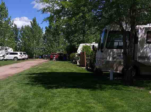Para Nordic skiing on display in Med Hat Adaptive Sport try it event
By JAMES TUBB on January 27, 2022.
jtubb@medicinehatnews.com@ReporterTubb Skiing can be for anyone of any ability and Medicine Hat Adaptive Sport and Recreation is looking forward to showcasing that. MHASR is putting on a try-it event for Para Nordic skiing on Feb. 5 in Elkwater at the Cypress Hills Learning Centre. The free event is open for kids and adults who want see what Para Nordic skiing is like and try it themselves. Provincial program director and Paralympic Sports Association program coordinator Tara Chisholm said they are very excited to put on the event, as they don’t usually get to host outdoor activities and are excited to show off the adaptive sport. “This will be the first time that I’m aware that people in this region of Alberta will have the chance to experience Para Nordic skiing,” Chisholm said. “So anyone of the many people who come to the try-it event, or the large majority, have never even seen adaptive skis before for cross country. So to expose people to what’s possible when it comes to adaptive sport, it will be pretty neat and be a fun experience for everyone.” MHASR recently received a strong turnout at a similar try it event for sledge hockey and are looking to provide the same chance for those interested in Para Nordic. Chisholm said they’re hoping many people of all ages and all abilities check it out and see what some adaptations are so anybody can get on the snow and try it out. “We’re hoping that we have some good numbers and people take the opportunity to get out to Elkwater because that is always a nice way to spend the weekend,” Chisholm said. Anyone interested is required to register before Feb. 1 to ensure there are enough skis rented out for the event. Nordiq Alberta will be bringing sit skis for individuals to try and skis are available from the Learning Centre for standing skiers. Registration can be done at mhasr.com/try-it-day.html Masks must be worn by all participants/volunteers/spectators. Athletes need to be masked until they are on their skis. Chisholm said there are different version of Para Nordic skiing based on whether athletes can stand or not and if they can utilize the poles or not. “For our standing skiers, there are people with disabilities who stand to ski, this could be our athletes with low vision or who are blind, they would have a guide in front of them to help support them if needed,” Chisholm said. “We also have athletes who maybe can’t hold the poles as well on their own due to amputations or due to upper body disability but can still ski standing up so they might just need additional support or coaching to do that. “When it comes to who can come and do it, it’s pretty open to all abilities for people to come and try it out, for people who maybe thought they couldn’t do skiing before.” 15-14
1 Comment
Oldest



